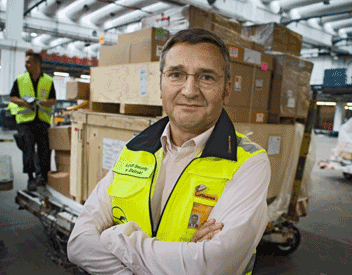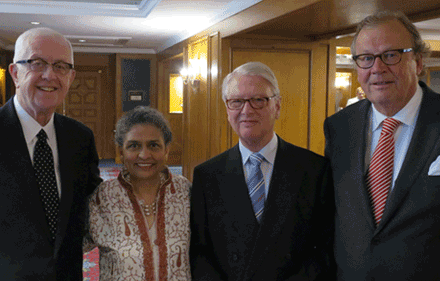Quotable First Six of 2014 Part III

Part 3 of this series continues
with some story clippings that share unique thoughts from the more than
150 exclusive and original feature-length articles created exclusively
for FlyingTypers’ readers during the
first half of 2014.

 April
2, 2014
April
2, 2014
Frankfurt Germany’s Commerzbank Arena is all about business,
as cargo security took center stage April 1 in a confrontation that
suffered no fools.
The local Bundesliga soccer team that
populates the venue might have spent the day thinking about their future,
but for the hard working, business-challenged air cargo industry, tomorrow
hung on today, as "Recognize Risks – Build Alliances"
brought Sabine Wiedemann, head of group security at Daimler AG Stuttgart,
to emphasize the theme—the need for partnerships throughout the
supply chain.
Hooray
For Harald
 Harald Zielinski, head of security and
environmental management, Lufthansa Cargo, presented "2020 in View"—security
strategy for air freight in times when change is the only constant.
Harald Zielinski, head of security and
environmental management, Lufthansa Cargo, presented "2020 in View"—security
strategy for air freight in times when change is the only constant.
Shipper certification turned out to be
less problematic than anticipated and all parties cooperated exceedingly
well, staving off the shipment avalanche many feared would result. Lufthansa
Cargo is building the most modern and efficient logistic center in the
world at Frankfurt Airport, to the tune of more than €700 million
Euro investment, due to open in 2020.
Key components of LCAG's security strategy
include staying close to its customers, maintaining quality, deploying
eCSD, ACAS (in the U.S.), EU PRECISE in conjunction with ACC3 (certifying
9-10 Lufthansa Group stations by end 2014), and segregation of shipments
from "green line" countries with security completed at the
origin, thus eliminating the need for repeated security checks down
the line.
Regulatory bodies are challenged to streamline
their respective processes. No single technology by itself satisfies
security requirement; therefore, looking ahead to 2020, the operative
word is to be proactive rather than reactive.
Harald encouraged all participants in
the air cargo chain to rise to evolving challenges and work together
because 100 percent security remains elusive.
A panel discussion followed with Wolfgang
Ischinger; Ingo Rahn, executive VP global airfreight DHL Global Forwarding;
Jörg Mendel, president LBA (Federal Aviation Authority); Gerold
Reichle, director/head of department BMVI; Peter Andres, head of corporate
security, Deutsche Lufthansa AG; and Franz-Josef Hammerl, director/head
of department BMI (Federal Ministry of the Interior).
The issue of the reciprocity principle
as it relates to security was addressed; panelists were in agreement
that cooperation is key at the EU level rather than bilateral agreement
(as practiced vis-à-vis the U.S.) to reflect both internal and
external security aspects. A strong and united European community offers
a better platform for an integrated security regime. Delays for transit
freight are a critical issue; complexity costs money, therefore, harmonizing
security is paramount for all participants. The inward look reveals
that the various EU member countries still have different regulations
and interpret them differently; hence the starting point is clearly
the challenge in Europe.
Franz-Josef Hammerl disagreed with other
panelists regarding transfer freight, for which he believes transit
security controls are essential. Winfried Hartmann, FRAPORT/Air Cargo
Club Germany, asked Herr Hammerl why credit card companies use trend
analysis routinely to proactively identify suspect transactions while
the security checks lag far behind, necessitating repeated transit security
checks. Hammerl acknowledged that developments are moving in that direction;
however, implementation will only be completed by 2020.
Additional risks stem from high dependence
on cyber security given the widespread use of IT and the related issue
of data integrity. EU employs 100 inspectors to audit security measures;
Peter Andres said he'd welcome the EU investing in at least 10 employees
to work on innovation and security concepts because otherwise the industry
would not be able to keep up with change and future challenges. Ingo
Rahn commented that the industry is well integrated in the security
discussions with the TSA in the USA and on the way in Europe, which
is more fragmented. He lamented the insufficient global standards for
security, recognizing the varying level of development across the globe,
a constant challenge.
Ted

 An
Evening With Jacques Ancher, April 28, 2014
An
Evening With Jacques Ancher, April 28, 2014
He may have “departed the building” 15 years ago, but last
Friday well-wishers gathered in a compact room as one of the truly great
executives of air cargo—a dreamer and doer unrivaled in our industry—Jacques
Ancher was finally inducted into the prestigious TIACA Hall Of Fame
in Istanbul, Turkey. During the last decade of the 20th century, Jacques
made history at KLM Cargo.
While ocean trade slipped past the picturesque
hotel windows, plying their way up from the Bosphorus to inland ports
and back out to sea, and air trade winged toward jam-packed Ataturk
International and (in a lyrical inspiration for FlyingTypers)
in and out of the only airport in the world named for a woman called
Sabiha, Jacques Ancher, a man who always loved air cargo, took the floor
and hit “refresh” on the air cargo thought process in a
simple, reasonable, and direct manner.

From left: Geoffrey
& Sabiha Arend with Jacques Ancher and “Wild Thing”
Jan Meurer, together for the first time in Istanbul last Friday as Jacques
joined the air cargo immortals in the TIACA Hall of Fame.
Jacques spoke for just a few minutes and
did so without notes—straight from the shoulder and right from
the heart.
“I am still fascinated by this business.
“If you stand back and take the
full view of air cargo, what is in clear focus is that this is a multi-billon
dollar business driven by a large, dedicated group that includes the
best, most prestigious companies in the world.
“Air cargo is really and truly golden.
“Although I have gotten along in
years since we last spoke when I retired from KLM, I cannot understand
why this beautiful cargo industry is still treated in some cases as
a stepchild.
“We must be doing something wrong,”
Jacques Ancher declared, as the room sat up and paid attention.
“I came here expecting to receive
an award, not to say much more, having never attended any industry events
or award dinners since I left 15 years ago.
“But once again talking to my former
colleagues and listening to your business scenarios and speeches here
tonight, especially the laudatory comments about me, I must admit I
am quite moved.
“I wish that they were all true,”Ancher
declared.
“But looking out on many of the
people here tonight, and how important this group is today in leading
the industry, I still feel air cargo is heading in the right direction.
“I also want to acknowledge the
time many of us had together and how we tried to change the air cargo
business.
“But I’d like to also say
that in retrospect there are two things I wish I had done differently.
“I wish I had gone to both aircraft
manufacturers Boeing and Airbus and asked them to deliver airplanes
without cargo bellies.
“The reasoning is that new airplanes
without cargo capacity would make all of our lives much simpler.
“Under that scenario, when an airline
bought an airplane the decision to carry cargo would also represent
a true commitment to the air cargo business.
“The second thing I would have done
differently is the way we attempted to change air cargo by organizational
structure within our company, KLM.
“If I did it again today, I would
inspire change through innovation.
“I believe the key to change is
people.
“Only through people can you change
what you are doing.
“If you can build innovation into
your structure you have a chance to win.
“In a broader sense, cargo needs
innovation.
“To build innovation you must allow
your people to experiment with new ideas, to see whether they can work
or not work.
“If you do that you will change
not only people’s outlook, you will also change air cargo.
“I only have to look at my grandchildren,
with their thumbs and fingers zipping across a tiny mobile keyboard
on a cell-phone or PDA to know that innovation is accelerating change
in the world.
“Air cargo could benefit greatly
by simply looking around and building its future by innovation.”
Jacques brought his own atmosphere into the room. You could feel the
air change as he moved about the place softly, in subdued elegance,
his words measured, thoughtful and full of promise.
You felt the barometric pressure rising
as he spoke.
I am absolutely certain if he were displeased
about something we might have felt the ballroom misting over last Friday.
Too bad you were not there.
Too bad we will not see his kind again
soon, if ever again, in air cargo.
Thanks Jacques.
Geoffrey /Sabiha






